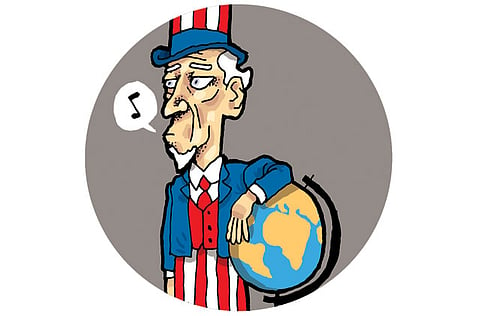Short-term thinking achieves nothing
Hyperventilating isn't going to get the US closer to a sensible Libya policy

America's political culture has developed a case of attention deficit disorder (ADD). There is not, really, any other way to explain the last few weeks in general and the debate (if one can call it that) over President Barack Obama's decision to intervene in Libya. Just as a child (or adult) with ADD has trouble focusing on a task long enough to complete it, the US' media-driven political culture seems to alter its view of events in Libya with every new day's news cycle.
Have Muammar Gaddafi's forces retaken a town they lost to the rebels last week? Clearly the entire insurgency is collapsing. Discipline in the rebel ranks is non-existent. A rout is imminent. Now, Obama faces the grave choice of escalating the situation with American ground forces or standing by as Gaddafi triumphs and America's prestige suffers a possibly fatal blow.
But wait — did the rebels make progress? Clearly Gaddafi is in retreat. We can rejoice that his end is near. But who, exactly, are the rebels? There are reports that Al Qaida likes Gaddafi even less than Washington does (albeit for somewhat different reasons).
Isn't this rapidly turning into a replay of Afghanistan in the 1980s? Is a naive US government once again empowering anti-American jihadists who will turn on Americans as soon as they have taken power?
And what of America's involvement itself? It is frighteningly extensive, or it was before America pretty much got out of Libya, passing control of the operation over to Nato.
On second thought, was that a good thing to do? Perhaps Washington compromises its prestige by letting Nato take charge. On the other hand, since the US is the leading power in Nato is it really accurate to say that Washington is disengaging?
Reputation at stake
And what of Obama himself? Do Americans admire his caution? His thoughtfulness before sending American troops into harm's way? Or do they criticise him for having taken nearly two weeks to make that fateful decision? Surely a more manly president would not have needed time to think through a significant commitment of military force.
In the meantime, everyone appears to have forgotten about those nuclear reactors in Japan — you know, the ones that are still damaged beyond repair and reported to be belching radioactive water into the ocean.
OK everyone. It is time to step back and take a deep breath. Wars, rebellions, natural and man-made disasters and the other events that make up the ebb and flow of foreign policy do not arise, panic everyone and resolve themselves according to the timelines of 24-hour news channels.
Hyperventilating over every small development in North Africa is not going to get America, or anyone else, closer to a sensible Libya policy (however one may define that term).
An argument can be made that this national case of ADD is symptomatic of a broader problem in American political culture: a collective inability to focus on the long term.
Obama, to his credit, seems to be more aware of this than any of his recent predecessors (of either party). Still, that has not prevented his administration from indulging in some very short-term thinking as the Middle East's Winter of Revolution has unfolded around him.
When Obama addressed the nation last week to explain what the US and its allies were doing in Libya and why, it was hard to miss the desire on his part to put himself and the US on the right side of history. The problem facing any president, however, is that making historically-right choices usually requires leaders to take the long view. In the short run, there are always political imperatives pulling in the opposite direction.
This is why the current near-panic in the US media over Al Qaida and the Libyan rebels has been so frustrating to watch. It is logical to assume that there are at least some Al Qaida-linked fighters among the disorganised rebel bands now sort-of in control of Eastern Libya.
From that statement to: ‘this is Afghanistan in the 1980s all over again' is, however, quite a leap.
For better or worse America, Britain, France, Nato and, yes, the Arab League, have all made decisions concerning Libya over the last month that have cast our collective lot with the rebels and against what remains of the Gaddafi government.
Our new allies are, no doubt, far from perfect and much about them remains unknown. One thing, however, can be said for sure: if we want to guarantee their enmity long into the future the best way to do it would be to fail to follow through on the moral and practical support we have all, in one way or another, promised.
Gordon Robison teaches Middle East politics at the University of Vermont.
Sign up for the Daily Briefing
Get the latest news and updates straight to your inbox


